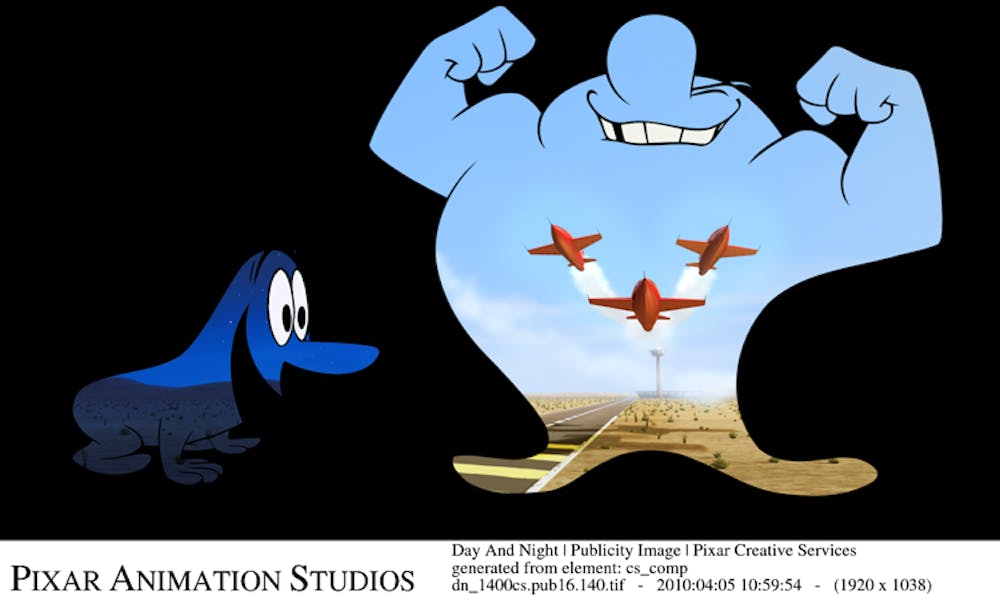Despite their limited releases, short films still have the power to make or break an attempt to win an Oscar pool. The good news for the amateur gamblers out there is that the 10 nominees for Best Animated Short and Best Live Action Short will be screened at the Ritz at the Bourse (on 4th Street between Market and Chestnut) for one week starting this Friday. And in case you can’t make it, Street’s got you covered with some mini–reviews of these mini–flicks.
Click here for reviews of the live action shorts!
Day and Night Director: Teddy Newton Runtime: 6 min. 5/5 Stars
Though you may have seen it this summer opening for Toy Story 3, Day and Night is a stand–alone piece worthy of its own audience. A charming story about overcoming fears of the unknown, Day and Night follows two characters personifying — surprise, surprise — day and night as they as they grow from initial enemies to friends.
Set against a black backdrop, the two characters’ human–like shapes also function as windows into their personas, with their emotions being portrayed by the action that takes place within the confines of their figures. As Night leaps in joy, fireworks explode inside the outline of his body. As Day frowns in anger, a hive of buzzing bees takes over his insides.
Through an imaginitive encounter between these eternal opposities, the filmmakers succeed in creating a touching picture of human insecurity and the acceptance of otherness. Its clever rendering of human insecurity and individual uniqueness definitely make Day and Night a short film to watch. — Jessica Kim
The Gruffalo Director: Max Lang and Jakob Schuh Runtime: 27 min. 2.5 /5 Stars
When a mouse seeks a nut in the woods, he relies on cunning deceit to outsmart his adversaries. One by one, he scares off Fox, Snake and Owl with tales of the abominable Gruffalo, his friend who has “terrible teeth in his terrible jaws.” Or at least that’s how Mouse tells it in The Gruffalo, adapted from Julia Donaldson’s children’s book by the same name. Like the book, the movie uses the type of Blue's Clues repetition and rhyme that young children rely on to follow a plot. For the rest of us, its rhythmic storytelling is only endearing for so long before it becomes dreary.
At times, the film feels a bit like watching a picture book. Directors Max Lang and Jacob Schuh bring the characters from Donaldson’s pages to a sort of half–life, trapped somewhere between static drawings and living creatures. Still, it's an entertaining way to kill a half hour while babysitting. — Molly Sprayregen
Let’s Pollute Director: Geefwee Boedoe Runtime: 6.5 min. 2.5/5 Stars
Let’s Pollute serves as a guide through history, tracing our species’ innate desire to destroy the environment. Using narration reminiscent of a kitschy 1950s educational video, the short also uses the same ham–handedness so ubiquitous in those films to make its point.
Director Geefwee Boedoe is far from subtle in his use of irony — the film offers helpful tips on how to create unbelievably large piles of trash. Unfortunately, there are far fewer tips about how to reduce them.
While the basic advice Let's Pollute offers is well–meaning, it essentially comes down to “don’t waste,” which isn’t exactly profound. Other topics of choice are totally brainless: the uncritical promotion of organic food might as well have been sponsored by Whole Foods.
Since those who need to recycle more will likely never see this film, Let’s Pollute is just preaching to the choir — the same choir that happens to fly private jets to the Oscars. — Michael Rubin
The Lost Thing Director: Andrew Ruhemann and Shaun Tan Runtime: 15 min. 3.5/5 Stars
In a world where uniformity reigns, a boy finds a thing that does not seem to belong to anyone or anywhere. Confronted with the apathy of his society, he decides to scour for the meaning of the creature and find its place in this world of order.
Adapted from the children’s book by renowned author and illustrator Shaun Tan, this animated short transports the audience through a grey and rigid universe that somehow demonstrates the immense creativity of the artist. The simple story actually delves into deeper themes such as the preservation of creativity, a task that seems impossible in such a regulated society. — Arthur Cohen
Madagascar: Carnet de Voyage (Madagascar: A Journey Diary) Director: Bastien Dubois Runtime: 11 min. 2/5 Stars
Madagascar, Carnet de Voyage commences with the opening of a book and a series of stunning illustrations that come to life, chronicling the wonder with which a European traveler encounters the Malagasy culture of Madagascar. Initially mesmerizing in its endless variety of animation techniques, ranging from pencil drawings to embroidery, the lack of union among these styles soon becomes tiresome.
Any idyllic serenity that the filmmakers seek to convey in their tender depiction of Madagascar is lost with the frenetic speed at which images shift, forcing viewers to adjust their perception. As the book closes on the film’s end, one feels as though they have been dragged through a whirlwind vacation, having seen everything and yet feeling regret at having appreciated nothing. — Elizabeth Horkley







